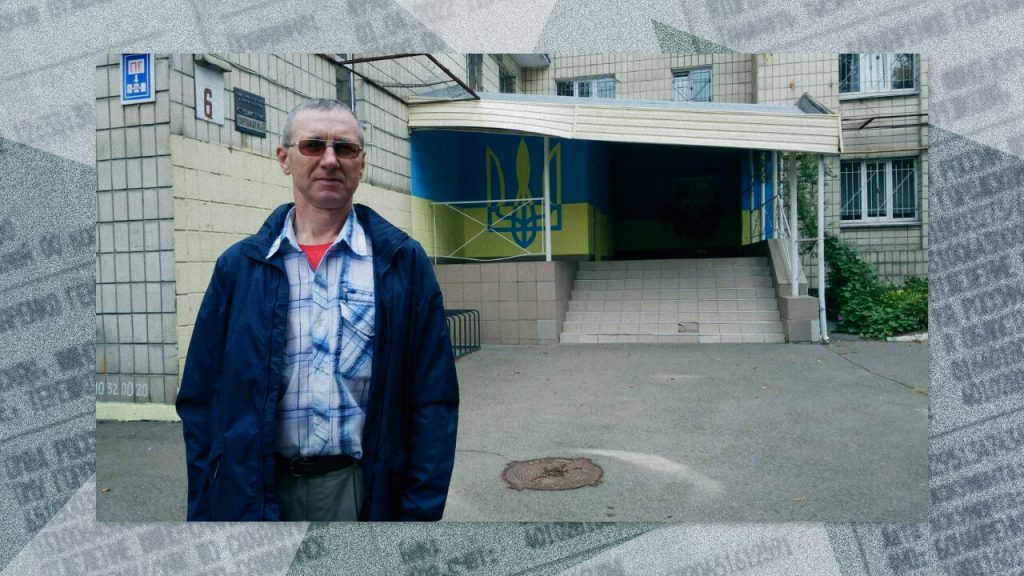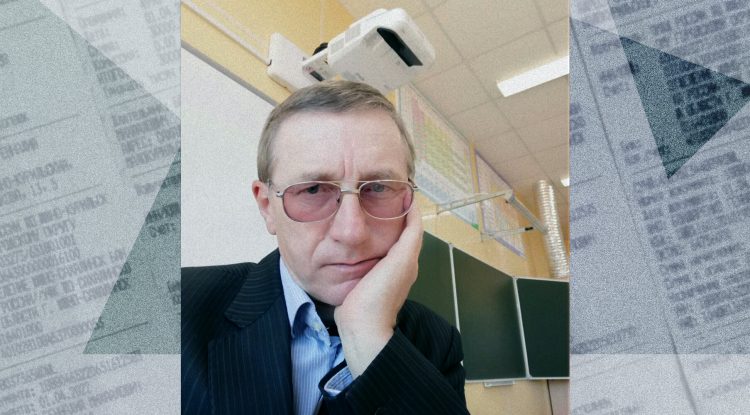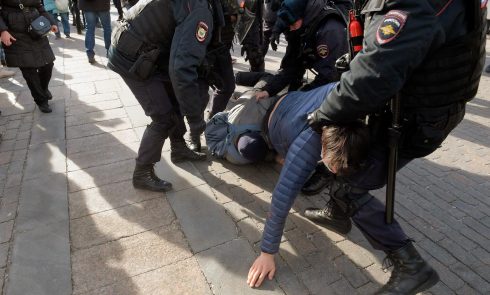In late March, Gennadiy Bondarenko, biology and chemistry teacher from the Malokurilskoye settlement on Shikotan island of the Russian Kuril archipelago off the coast of Japan, was charged on four counts of discrediting the Russian Armed Forces. The case against him is based on reports by his colleagues, 8th grade students, as well as members of local government. Holod tells the story of a teacher in Russia, whose Ukrainian home village was bombed out, and, instead of receiving support from his colleagues, he was forced to resign from his workplace of 30 years.
On March 19th, Bondarenko was scrolling through his news feed after class time, when he stumbled upon a piece in a Ukrainian media, which reported that Kyinka, a settlement in the Chernihiv Region, had been shelled by the Russian army using Smerch rocket launchers.
Bondarenko was no stranger to this settlement—he was born and raised in Kyinka, and his parents live there to this day. Upon graduating from a university in Kiev, Bondarenko first came to the island of Shikotan in the early 1990s. In 1993, he was offered a job as a schoolteacher in the Malokurilskoye settlement, however, he decided to pursue a career in his native Ukraine. For a while he worked at chemical disposal facilities in Slavutych, a town 60 kilometers off Chernobyl. In 1994, Bondarenko decided to come and help rebuild Shikotan when it was affected by an earthquake. The year after, he moved there and accepted the job of a local schoolteacher.
Despite the entirety of Russia’s landmass between them, Bondarenko stayed in touch with his parents and visited them regularly. He says that up until the war began he didn't believe Russia would invade Ukraine, and that's what he was telling his parents. When they spoke on the phone on February 26th, Kyinka already came under air raids. The teacher’s elderly father suffered a micro stroke, which obstructed him from taking cover in their cellar, whenever the village was under attack.
The news report of Kyinka’s destruction in March that Bondarenko read included photos. “Fences and outhouses destroyed, tree roots torn out,—the teacher recalls. “I noticed that my parents were last online the day before. I thought to myself, since the houses were obliterated, there is no chance that the cellars were unaffected.”
At that moment, Bondarenko, as he says, “was in desperate need of a friendly face.” The teacher asked a colleague, PE teacher, Vyacheslav Moroz, to come see him in his classroom. Bondarenko showed him the pictures of the bombed out Kyinka, saying: “Look what they’ve done to my village!” Then the vice principal, Irina Illarionova, entered the classroom; at the beginning of the war, she consulted with Bondarenko, if the American flag in the English classroom should be taken down as inappropriate. “She asked all intrigued: ‘What are you guys looking at?’”—the teacher recounts. At which point Bondarenko started shouting and knocked down a desk chair, propped up on a school desk, as well as “used explicit language directed at Putin.”
Illarionova exited the classroom without saying a word. Bondarenko remembered this quarrel only once he read about it in the police report which he was presented with when accused of “discrediting” the Russian military.
Report reads: “Bondarenko G.M. in the presence of PE teacher Moroz V.N. and the vice principal of the Malokurilskoye Municipal School, Illarionova I.M., said 'we were all brainwashed,' 'your mo***ucker Putin did this,' by doing which Bondarenko perverted and discredited the avowed activity of the Russian Armed Forces on foreign territory.”
“You think murdering my parents is the right thing to do?”
Bondarenko didn’t use to come over for dinner to any of his colleagues, but up until the war there were no conflicts either. And whenever they asked for his help, he always reached out. “The vice principal, Illarionova, would call and ask me to fix a faucet or do other plumbing work,”—he recounts. In his personal garden, he grew carrots which he would give out to his colleagues at the school: “I gave some to the principal, to Illarionova, to [civics teacher Anastasia] Serebryanaya.”
Bondarenko considers the March situation to have been “purely political.” One of the days following the bombardment of Kyinka, the teacher saw a car in the parking lot with the Z symbol [of the Russian invasion] on its hood. Taking a closer look, he realized this car belonged to the geography teacher, Marina Zolotaryova, whom he had helped to acquire the vehicle. He rushed out of the school building, where he ran into her friend, Serebryanaya. “Tell your friend to remove the Z. I am so angry right now that I might just throw a brick through the windshield,”—he recounts his own words. “She said: ‘Ok’—as she walked on by.”
Later that day, when Bondarenko returned home, Zolotaryova called him, but he did not pick up, having decided to speak to her personally the day after. “I came by her classroom and said: ‘Did you see what they’ve done to my home village? They burned it to the ground. Do you think that’s fair? You think murdering my parents or my sister is the right thing to do?’ And she went: ‘That is my personal opinion.’”—says Bondarenko. Unable to contain himself once again, he struck a nearby school desk with his fist and stormed out.
The car incident was later recorded in the second case against Bondarenko.
Report reads: “In front of geography teacher, M.N. Zolotaryova, Bondarenko G.M. insinuated that she ‘did not understand the meaning of the Z pasted on her automobile, that Russian mass media was “brainwashing” and “zombifying” the population,’ ‘starting Feb. 24th 2022, his parents, residents of Ukraine, have been hiding in their cellar to avoid shelling by the Russian troops,’ by doing which Bondarenko perverted and discredited the avowed activity of the Russian Armed Forces on foreign territory.”
Bondarenko explains his frustration. In 2019, he lent Anastasia Serebryanaya (civics teacher) 20 thousand rubles. As it turned out, this money was needed to help Zolotaryova relocate to Shikotan, so that she could start working at their school. Some time later, Serebryanaya needed to borrow money on Zolotaryova’s behalf again, however, this time it was 250 thousand rubles to pay for her relative’s cancer treatment. “You try to help people, but when you tell them that your hometown was demolished ... it turns out that they support this happening, and are saying ‘This is my personal opinion,’—Bondarenko explains. “That’s why I lost my temper and banged on the desk.”
Holod contacted Marina Zolotaryova to uncover the origin of her name's appearance on the police report. “That was the authorities’ initiative and I will leave it at that. The last thing I am going to say is that Gennadiy Mikhailovich [Bondarenko] brought this upon himself, and I only ever treated him with respect. What else is there to talk about?”—says the teacher. In the correspondence, when Holod attempted to clarify if Zolotaryova was aware that due to her statement, Bondarenko was accused of discrediting the Russian army, she threatened to pass the reporter’s credentials to the Investigative Committee of Russia. “I familiarized myself with your work and realized what your affiliations are,”—she added. “It's all clear to me. But know this, it is not enough to live in Russia. You have to love your country and be its true patriot. Good luck to you, but considering the message you are offending my country with; I don’t think this land belongs to you.”

“A psychiatrist will determine why you’re so violent”
Bondarenko was unable to contact his family until late March—they didn’t have cellular reception due to the bombings. He learned that his family was safe later, from his niece, who had managed to evacuate.
The day that Bondarenko yelled at Zolotaryova, he was paid a visit by the head of the island’s local government, Sergei Usov, and his subordinate, Igor Kostryukov—they personally came to the school demanding an explanation from the teacher. “I tell them: ‘How am I supposed to react when my village was destroyed, I don’t know if my family made it out alive, while these guys are showing off Zs and having a blast.’”—says Bondarenko. According to him, they began discussing the situation in Ukraine, and Usov said that a relative of his was killed in Donbas.
Bondarenko showed the officials photos of the ruins of his Kyinka, which he later came to regret—that became the basis for yet another case against him.
Report reads: “In the presence of local government head, Usov S.M., and an employee of the local government of Shikotan island, Kostryukov I.V., and Malokurilskoye Municipal School principal, Khromchenkova A.O., Bondarenko G.M. related that ‘his parents reside in Ukraine, Chernihiv Region, and the settlement they are in is constantly under attack by the Russian military,’ exhibited photographic evidence of a shell crater, from which he inferred it to be the doing of the Russian Armed Forces in the course of the special military operation, initiated on Feb 24th, 2022, he also accused the Russian public television and other media sources of perverting the truth and ‘brainwashing the population,’ by doing which Bondarenko G.M. perverted and discredited the avowed activity of the Russian Armed Forces on foreign territory.”
That day, March 23rd, the government officials and the school principal, Anna Khromchenkova, convinced Gennadiy Bondarenko that he needs to collect himself and take time off until April 3rd. That day, when he returned home, the police arrived at his residence.
The teacher decided not to open the door. “They banged on the door for an hour and a half. One was pounding on the door, the other was throwing snowballs at my window. The district police officer even tried to unlock the door with some random key.” The police left, however, after some time passed, Bondarenko’s friends urged him to call the police chief, Alexandr Dulin, for a “friendly chat.” Following that phone call, Bondarenko agreed to meet with the policeman. When he went out, the teacher noticed that next to Dulin stood “a broad-shouldered dude with short hair”, who introduced himself as an employee of the Education Department of the South Kuril City District.
“We started talking about politics. I asked: ‘So what, is 1937 (the first year of Stalin’s Great Terror.—ed. Holod) making a comeback? Why can’t a person voice their opinion?’”—Bondarenko recounts. In the end the teacher agreed to be brought to the nearby police station. Bondarenko explains his reasoning for making this decision: “If you have ever dealt with the police, you understand how they do things. If you haven’t [like me, you don’t expect anything bad to happen] … Moreover, I knew the police chief quite well.”
When the three of them started driving, Bondarenko noticed that they were headed in the direction of the hospital—opposite of where the police station is. “I asked: ‘Where are we going?’ to which they replied ‘We’re going to stop by the psychiatrist’s office, he also wants to have a chat with you about your violent outbreaks,’”—he remembers. The doctor turned out to be an acquaintance of Bondarenko’s as well, Viktor Usichenko, with whom they once chaperoned a school trip to Japan. The psychiatrist asked if “Bondarenko was hearing voices, if he ever felt like he was being chased by something.” After the screening, Bondarenko and his escorts, together with the doctor, headed for the police station.
There, the person that introduced himself as an education department employee, sat down and started writing a report. “I was trying to break loose as hard as I could. The doctor also threatened me that if I kept this behavior up, the only way I was going to leave this building was in a straitjacket,—Gennadiy Bondarenko remembers.—I admitted to some things, downplaying everything as much as possible. Then the guy writing the report asked for my phone, saying: ‘Need to check if you are affiliated with any known extremist organizations.’”
Human rights activists from OVD-Info related 107 police reports to Holod, all of which were filed from denunciations. However, this is only a fraction of such cases. Over 3000 cases for “discrediting the military” have been opened by the end of July. According to the activists, approximately 10% of them were opened due to denunciation.
The majority of denunciation-related administrative cases were opened in Crimea, St. Petersburg, and Sakhalin Region
Most often, “discrediting” is reported being exhibited on streets (picketing, arguing, spreading pacifist symbology) or in public places — cafes, shops
Most administrative cases are opened due to expressions of pacifism in personal conversations and social media posts. The rarest of cases have to do with the removal of the “Z” symbol from public places or exhibiting pacifist symbology
The most common penalty for this offense is a 30,000 rubles fine. The amount varies between 15,000 and 50,000 rubles.
“You can’t prove anything to people who trust Russian propaganda”
In the following days, the school was constantly patrolled by the police. As it turned out, the police were there to question the teachers and students. Bondarenko remembers that the school principal would tell him: “I told them what a good person you were, how helpful and generous you were.” Some time later, according to Bondarenko, Serebryanaya came by his classroom and asked him how he was doing. Bondarenko said: “Bad. Couldn’t be worse.”
— You know, I told the police how awesome you were,—she told him
— That’s not going to cut it this time,—he replied.
In a few days, Bondarenko was called to the police station once again, where he found out that due to his colleagues’ and students’ depositions, the police have opened four administrative cases against him.
Report reads: "In front of 8th ‘B’ grade students of Malokurilskoye Municipal School, Bondarenko G.M. said that the letter Z on Russian military hardware, which takes part in the special military operation in Ukraine, is akin to a ‘Zieg Heil’ and that that was how fascists greeted each other in Nazi Germany. He also claimed that ‘this letter stands for “invaders” [Russian word starts with a Z],—talking about the Russian Armed Forces taking part in the special military operation in Ukraine,—that Russia is bombing Ukraine, which forces civilians to live in the underground,’ by doing which Bondarenko G.M. perverted and discredited the avowed activity of the Russian Armed Forces on foreign territory”
The teacher did not show up for the court hearing—his case was being judged at the South Kuril District Court, which is located on a different island of the archipelago. A few days later, the district police officer delivered Bondarenko the court ruling: a 30 thousand ruble fine for each of the four reported counts. According to Bondarenko, it was not the heftiest of sums for him—due to extra subsidies for teachers in remote areas, his salary was around 200 thousand rubles per month.
“An acquaintance asked me: ‘Why didn’t you speak to a lawyer?’”—Bondarenko recounts. “Here is how the local system works: if they want to bring you in, no lawyer could help, you won’t be able to prove anything.” Upon receiving the court ruling, Bondarenko decided to resign his position at the local school: “I pounded on desks and that is legally considered amoral behavior, so I resigned preemptively so as not to get fired for legal reasons.”
Gennadiy Bondarenko does not have any concrete plans for the future just yet. “I have some savings, I have my garden,—he says.—I have thought about returning to my parents in Ukraine, but starting July 1st, I need a visa to enter Ukraine with a Russian passport, which effectively means that it is impossible. I have thought about emigrating. I have a cousin in Latvia, but I haven’t spoken to him in a long time. Moreover, there are a lot of Ukrainian refugees in Europe now, so there is probably no work for someone like me.” Bondarenko was able to call his parents for the first time in mid-April. He decided not to tell his parents about what happened just yet.
Bondarenko thought that no one wanted anything to do with him in Malokurilskoye, but “when I passed by, at least no one gave me any dirty looks.” He broke off all contact with his former colleagues that denunciated him: “You can’t prove anything to people who trust Russian propaganda.”

